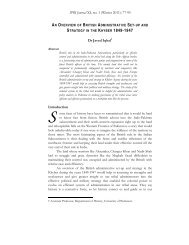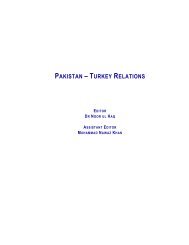120 Whither Kashmir? (Part II) - Islamabad Policy Research Institute
120 Whither Kashmir? (Part II) - Islamabad Policy Research Institute
120 Whither Kashmir? (Part II) - Islamabad Policy Research Institute
You also want an ePaper? Increase the reach of your titles
YUMPU automatically turns print PDFs into web optimized ePapers that Google loves.
76 IPRI Factfile<br />
called upon the parties to accept, in case of failure of demilitarization of<br />
the State of Jammu and <strong>Kashmir</strong>, arbitration by arbitrators appointed by<br />
the President of the World Court in consultation with the parties.<br />
Pakistan accepted the proposal while India rejected it. Subsequently<br />
during the Security Council debate on <strong>Kashmir</strong> in 1962, Pakistan's<br />
Foreign Minister, Sir Zafrulla Khan showed readiness to refer the dispute<br />
to any forum including the International Court of Justice in order to<br />
determine the obligations of parties and other matters blocking the<br />
progress. India refused to respond positively to the invitation on the<br />
pretext that it was a political matter.<br />
How do we explain the Indian and Pakistani reluctance to submit<br />
the <strong>Kashmir</strong> dispute to the World Court or to an arbitration tribunal?<br />
The Indian Prime Minister Pundit Nehru explained the Indian position<br />
by stating that the matter was of political nature and hence was not<br />
justiciable. Pakistan has not clearly spelled out its doctrinal position in<br />
the matter but presumably it is no different from that of India. But what<br />
does the statement of the Indian Prime Minister signify and how far is it<br />
tenable?<br />
Generally disputes are classified into two categories, namely, legal<br />
and political or justiciable and non-justiciable. Political or non-justiciable<br />
disputes are those which are not susceptible of settlement by the<br />
application of generally recognized rules of international law for reason<br />
of material insufficiency and inadequate development of the law of<br />
nations. The real test of the distinction between legal and political<br />
disputes is not the limitation of judicial function based on the<br />
applicability of legal rules but rather the relative importance of the<br />
subject matter of controversy. Those disputes are thus political and<br />
therefore non-justiciable which affect the important or vital interests of<br />
Stats [States]. In 1922 many members of the Institut de Droit<br />
International described as political all disputes affecting the independence,<br />
honour and the vital interests of nations.<br />
On the basis of the foregoing, Governments have often insisted that<br />
obligatory judicial settlement of disputes must be restricted to minor<br />
issues. The idea of unimportant matters falling in the category of legal<br />
disputes was the dominant theme of the two Hague Peace Conferences.<br />
However, it is by virtue of their conduct rather than general legal<br />
formulas that States have adopted the view that obligatory judicial<br />
settlement must be limited to matters of minor importance.




